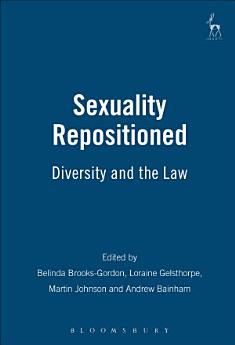Sexuality Repositioned: Diversity and the Law
Belinda Brooks-Gordon · Loraine Gelsthorpe · Martin Johnson M.A., PhD., F.R.C.O.G. · Andrew Bainham
জুন ২০০৪ · Bloomsbury Publishing
১.০star
১ টা পৰ্যালোচনাreport
ইবুক
456
পৃষ্ঠা
reportমূল্যাংকন আৰু পৰ্যালোচনা সত্যাপন কৰা হোৱা নাই অধিক জানক
এই ইবুকখনৰ বিষয়ে
Despite the advent of new sexual knowledges,new perspectives, new experiences even, we do not routinely or habitually reflect on the interface of social and legal dimensions of sexuality. Rather, the law is periodically reviewed in response to some crisis or campaign. The idea for the book thus came from awareness that it is important to explore some of the social and moral censures, contours and controversies that shape and mark the boundaries of sexuality. The production of the book has coincided with a major review and new legislation concerning sexual offences, fuelling the authors' concerns and making their explorations timely.
Interdisciplinary in scope, drawing in biological, psychological, sociological and historical perspectives to set out the new battlegrounds of sexuality, for instance, but with particular emphasis on socio-legal issues, the book examines the following areas: the development of sexuality and the right to define one's sexuality; genetic maps and sexual politics; sexuality and same sex relationships in law; the law in relation to intersecting oppressions concerning lesbians, gay men and trans people; the sexual abuse of children and the limitations of the law; the contours of regulation concerning young people, 'sexual health', and prostitution; sexual freedoms versus protectionist debates; sexuality, desire and embodied performances in the workplace; sexuality, film and the law, and the law on sexuality in the everyday practice of the Care Standards Tribunal. The book also reviews the recent reform of sexual offences and examines the current vogue for psychological treatment interventions for
sexual offenders. This book offers a highly original and exciting new exploration of contemporary socio-legal issues in relation to different sexual positions.
Interdisciplinary in scope, drawing in biological, psychological, sociological and historical perspectives to set out the new battlegrounds of sexuality, for instance, but with particular emphasis on socio-legal issues, the book examines the following areas: the development of sexuality and the right to define one's sexuality; genetic maps and sexual politics; sexuality and same sex relationships in law; the law in relation to intersecting oppressions concerning lesbians, gay men and trans people; the sexual abuse of children and the limitations of the law; the contours of regulation concerning young people, 'sexual health', and prostitution; sexual freedoms versus protectionist debates; sexuality, desire and embodied performances in the workplace; sexuality, film and the law, and the law on sexuality in the everyday practice of the Care Standards Tribunal. The book also reviews the recent reform of sexual offences and examines the current vogue for psychological treatment interventions for
sexual offenders. This book offers a highly original and exciting new exploration of contemporary socio-legal issues in relation to different sexual positions.
মূল্যাংকন আৰু পৰ্যালোচনাসমূহ
১.০
১ টা পৰ্যালোচনা
লিখকৰ বিষয়ে
Belinda Brooks-Gordon is a Lecturer in Psychology at Birkbeck College University of London.
Loraine Gelsthorpe is a Reader in Criminology and Criminal Justice at the University of Cambridge and Fellow of Pembroke College.
Martin Johnson is Professor of Reproductive Sciences in the University of Cambridge and a Fellow of Christ's College.
Andrew Bainham is a Fellow of Christ's College, Cambridge and Reader in Family Law and Policy at the University of Cambridge.
Loraine Gelsthorpe is a Reader in Criminology and Criminal Justice at the University of Cambridge and Fellow of Pembroke College.
Martin Johnson is Professor of Reproductive Sciences in the University of Cambridge and a Fellow of Christ's College.
Andrew Bainham is a Fellow of Christ's College, Cambridge and Reader in Family Law and Policy at the University of Cambridge.
এই ইবুকখনক মূল্যাংকন কৰক
আমাক আপোনাৰ মতামত জনাওক।
পঢ়াৰ নির্দেশাৱলী
স্মাৰ্টফ’ন আৰু টেবলেট
Android আৰু iPad/iPhoneৰ বাবে Google Play Books এপটো ইনষ্টল কৰক। ই স্বয়ংক্রিয়ভাৱে আপোনাৰ একাউণ্টৰ সৈতে ছিংক হয় আৰু আপুনি য'তে নাথাকক ত'তেই কোনো অডিঅ'বুক অনলাইন বা অফলাইনত শুনিবলৈ সুবিধা দিয়ে।
লেপটপ আৰু কম্পিউটাৰ
আপুনি কম্পিউটাৰৰ ৱেব ব্রাউজাৰ ব্যৱহাৰ কৰি Google Playত কিনা অডিঅ'বুকসমূহ শুনিব পাৰে।
ই-ৰীডাৰ আৰু অন্য ডিভাইচ
Kobo eReadersৰ দৰে ই-চিয়াঁহীৰ ডিভাইচসমূহত পঢ়িবলৈ, আপুনি এটা ফাইল ডাউনল’ড কৰি সেইটো আপোনাৰ ডিভাইচলৈ স্থানান্তৰণ কৰিব লাগিব। সমৰ্থিত ই-ৰিডাৰলৈ ফাইলটো কেনেকৈ স্থানান্তৰ কৰিব জানিবলৈ সহায় কেন্দ্ৰত থকা সবিশেষ নিৰ্দেশাৱলী চাওক।






